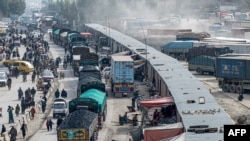Pakistan is set to reopen the main Torkham border crossing with landlocked Afghanistan on Friday following a nine-day closure because of terrorism and other security concerns, according to officials in both countries.
The development came after the Taliban's foreign minister, Amir Khan Muttaqi, promised during a meeting Thursday with Islamabad's acting ambassador in Kabul that the group would not permit the use of Afghan soil to carry out acts of terrorism against Pakistan, a Pakistani official told VOA on condition of anonymity because he was not authorized to interact with the media publicly.
Muttaqi’s office said that in the meeting with the Pakistani envoy, Ubaid Nizamani, they discussed the border closure and problems facing Afghan refugees and traders in Pakistan. The statement said both sides emphasized the need for addressing these issues, but it gave no other details.
Late Thursday, the Taliban state news agency quoted a senior border official, Esmatullah Yaqoob, as announcing to Afghan travelers, including patients seeking medical treatment in Pakistani hospitals, that the Torkham gate “will open for passengers and transit on Friday morning.”
A Pakistani border security official confirmed that all immigration and security personnel have been instructed to return to duties early Friday to facilitate pedestrian and vehicular traffic through the Torkham gate.
Pakistan temporarily closed the busy transit point for trade and travelers on September 6 after security forces from the two countries exchanged fire. The clashes killed two Afghans, including a Taliban guard. The incident occurred shortly after militants had staged a deadly cross-border assault on Pakistani outposts elsewhere along the 2,600-kilometer frontier separating the two countries.
The Torkham closure has stranded hundreds of trucks carrying commercial goods, mostly fresh Afghan fruits and vegetables, and thousands of travelers on both sides of the border.
Earlier Thursday, the Pakistani Foreign Ministry spokesperson indicated at a weekly news conference that Islamabad could soon open the Torkham crossing.
“I must underline that the closure of the border is temporary. And we will make the decision regarding its opening in view of the developments that take place in the coming hours and days,” Mumtaz Zahra Baloch said without elaborating.
Islamabad defended its decision to shut the Torkham transit point, saying Taliban authorities were trying to build “unlawful structures” on its territory and opened fire when challenged by Pakistani security forces.
Pakistani officials said the attack on the same day against two outposts in the northern Chitral border district was carried out by hundreds of heavily armed militants from bases on the Afghan side. The Pakistani military said four soldiers and 12 assailants died in the raid.
“Pakistan is concerned about the security threat emanating from Afghanistan … and that is why it is important for the Afghan interim authorities to ensure that Afghan territory is not used to threaten Pakistan,” Baloch said Thursday.
The Tehrik-i-Taliban Pakistan, or TTP, claimed responsibility for the Chitral attack. The banned militant group has for years been plotting bombings and other terrorist attacks in Pakistan.
Islamabad says TTP leaders and fighters have increased cross-border raids from Afghan soil since the Taliban seized power in Kabul two years ago. Taliban authorities reject the charges.
Pakistani security sources asserted that scores of Afghan Taliban fighters had joined TTP in the Chitral raid, saying Islamabad shared the evidence with Kabul to substantiate its claims.
TTP, also known as the Pakistani Taliban, is listed as a global terrorist organization by the United States. It is an offshoot and close ally of the Afghan Taliban.
Tom West, the U.S. special representative for Afghanistan, said Tuesday that TTP "is posing the greatest threat" to regional stability. "We see a very significant increase in [TTP] attacks directed at Pakistan,” he told a seminar in Washington.
West said the militant group had helped the Taliban mount insurgent attacks against American and NATO troops, which left the country in August 2021 after nearly 20 years of involvement in the Afghan war.
"They became allies of the Taliban during the war. They were financial supporters, logistical supporters and operational allies, as well. I think the ties between them are quite tight,” the U.S. envoy noted.
The United Nations estimated in its latest assessment that at least 4,000 TTP operatives are based in Afghanistan.




